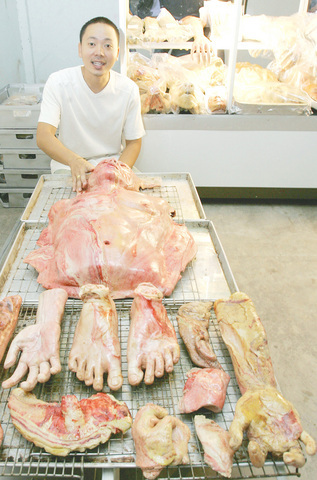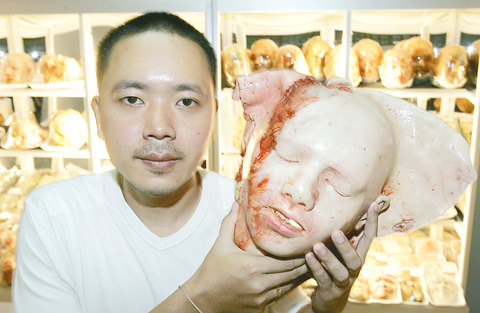Inside a dark room, realistic-looking "human body parts" are stacked on shelves and hanging on meat hooks. The place looks like a mortuary or the lair of a serial killer, but in fact, it's a bakery.
What appears to be putrefying body parts are the bread sculptures of 28-year-old art student Kittiwat Unarrom.
"Of course, people were shocked and thought that I was mad when they saw the works. But once they knew the idea behind it, they understood and became interested in the work itself, instead of thinking that I am crazy," said the fine arts masters-degree student.

PHOTO: AP
He hopes his realistic artwork will make people ponder whether they are consuming food, or food is consuming them.
"Everyone's life is rushed nowadays, even when it comes to eating," he said. "When we eat, we don't think about our health or safety, we only think of our taste buds."
As an undergraduate, Kittiwat started painting portraits. He then moved to mixed media and finally dough -- a natural medium for him since his family runs a bakery.

PHOTO: AP
Along with edible human heads crafted from dough, chocolate, raisins and cashews, Kittiwat makes human arms, feet, and chicken and pig parts. He uses anatomy books and memories of visiting a forensics museum to create the human parts.
He now is receiving regular orders from the curious and from pranksters who want to surprise their friends or colleagues, but that's a minor sideline.
By the end of the year, Kittiwat's confectionary slaughterhouse will go on display at Bangkok's Silpakorn University. It's his final dissertation, and he hopes it will secure him a master of arts degree.
"When people see the bread, they don't want to eat it. But when they taste it, it's just normal bread," he said. "The lesson is `don't judge just by outer appearances."'

DAREDEVIL: Honnold said it had always been a dream of his to climb Taipei 101, while a Netflix producer said the skyscraper was ‘a real icon of this country’ US climber Alex Honnold yesterday took on Taiwan’s tallest building, becoming the first person to scale Taipei 101 without a rope, harness or safety net. Hundreds of spectators gathered at the base of the 101-story skyscraper to watch Honnold, 40, embark on his daredevil feat, which was also broadcast live on Netflix. Dressed in a red T-shirt and yellow custom-made climbing shoes, Honnold swiftly moved up the southeast face of the glass and steel building. At one point, he stepped onto a platform midway up to wave down at fans and onlookers who were taking photos. People watching from inside

A Vietnamese migrant worker yesterday won NT$12 million (US$379,627) on a Lunar New Year scratch card in Kaohsiung as part of Taiwan Lottery Co’s (台灣彩券) “NT$12 Million Grand Fortune” (1200萬大吉利) game. The man was the first top-prize winner of the new game launched on Jan. 6 to mark the Lunar New Year. Three Vietnamese migrant workers visited a Taiwan Lottery shop on Xinyue Street in Kaohsiung’s Gangshan District (崗山), a store representative said. The player bought multiple tickets and, after winning nothing, held the final lottery ticket in one hand and rubbed the store’s statue of the Maitreya Buddha’s belly with the other,

‘NATO-PLUS’: ‘Our strategic partners in the Indo-Pacific are facing increasing aggression by the Chinese Communist Party,’ US Representative Rob Wittman said The US House of Representatives on Monday released its version of the Consolidated Appropriations Act, which includes US$1.15 billion to support security cooperation with Taiwan. The omnibus act, covering US$1.2 trillion of spending, allocates US$1 billion for the Taiwan Security Cooperation Initiative, as well as US$150 million for the replacement of defense articles and reimbursement of defense services provided to Taiwan. The fund allocations were based on the US National Defense Authorization Act for fiscal 2026 that was passed by the US Congress last month and authorized up to US$1 billion to the US Defense Security Cooperation Agency in support of the

‘COMMITTED TO DETERRENCE’: Washington would stand by its allies, but it can only help as much as countries help themselves, Raymond Greene said The US is committed to deterrence in the first island chain, but it should not bear the burden alone, as “freedom is not free,” American Institute in Taiwan Director Raymond Greene said in a speech at the Institute for National Defense and Security Research’s “Strengthening Resilience: Defense as the Engine of Development” seminar in Taipei yesterday. In the speech, titled “Investing Together and a Secure and Prosperous Future,” Greene highlighted the contributions of US President Donald Trump’s administration to Taiwan’s defense efforts, including the establishment of supply chains for drones and autonomous systems, offers of security assistance and the expansion of